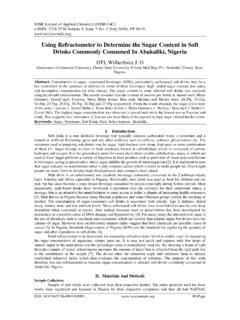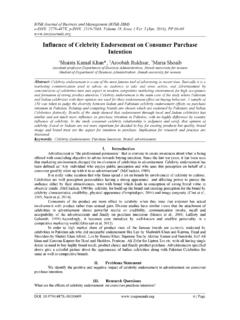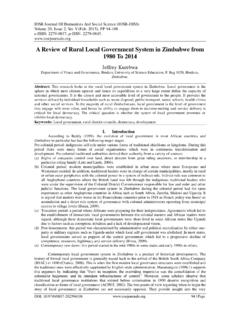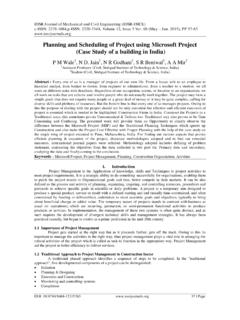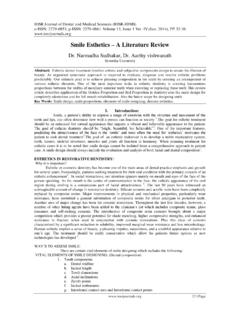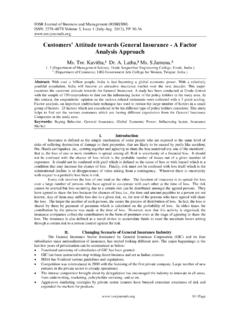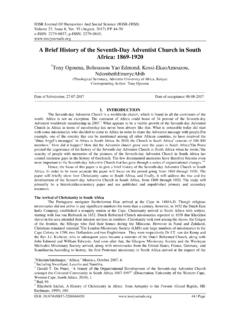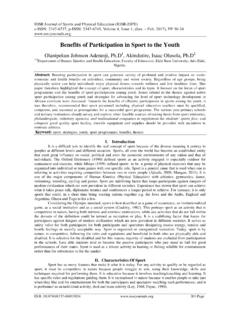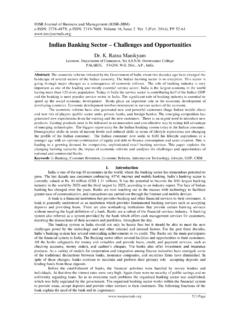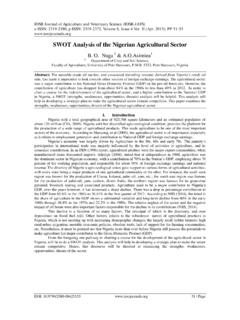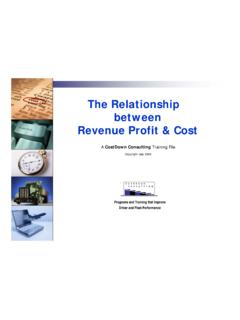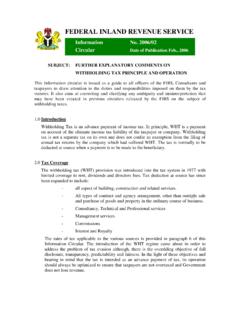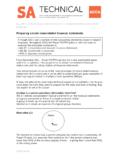Transcription of The Impact of Tax Revenue on Economic Growth: …
1 IOSR Journal of Economics and Finance (IOSR-JEF). e-ISSN: 2321-5933, p-ISSN: 7, Issue 1. Ver. I (Jan. -Feb. 2016), PP 32-38. The Impact of Tax Revenue on Economic growth : Evidence from Nigeria Cornelius M. Ojong1, Ogar Anthony2 & Oka Felix Arikpo3. Department of Banking & Finance, University of Calabar, Calabar, Nigeria. Abstract: The study examined the Impact of tax Revenue on the Nigerian economy. The objectives of the study were; to examine the relationship between petroleum profit tax and the Nigeria economy, the Impact of company income tax on the Nigerian economy and the effectiveness of non oil Revenue on the Nigerian economy.
2 Data were sourced from Central Bank Statistical Bulletin and extracted through desk survey method. Ordinary least square of multiple regression models was used to establish the relationship between dependent and independent variables. The finding revealed that there is a significant relationship between petroleum profit tax and the growth of the Nigeria economy. It showed that there is a significant relationship between non oil Revenue and the growth of the Nigeria economy. The finding also revealed that there is no significant relationship between company income tax and the growth of the Nigeria economy.
3 It was recommended that government should endeavour to provide social amenities to all nooks and crannies of the country. Also that government should engage in a complete re-organization of the tax administrative machineries; in order to reduced tolerable problems of tax evasion and avoidance and finally, to enhance the tax base of government, employment opportunities should be created and a good environment for entrepreneurship and innovation to thrive made using tax proceeds. Keywords: Taxation, Economic growth , Company Income Tax, Petroleum Profit Tax Non Oil Revenue Tax Compliance, Tax Evasion and Tax Avoidance I.
4 Introduction The need for tax payments has been a phenomenon of global significance as it affects every economy irrespective of national differences (Oboh & Isa, 2012). Taxation is an age long event. The need for its payment was emphasized by Jesus in Mathew 22 vs 17-21 when the Pharisees asked Him whether it was lawful to pay taxes or not. His reply render therefore unto Caesar the things which are Caesar s and to God the things that are to God s suggests that tax payments should be compulsory, non negotiable, binding and obligatory on all citizens of a country regardless of religion and social status.
5 What then is tax? Tax is a compulsory charge imposed by a public authority on the income and properties of individuals and companies as stipulated by the government Decree, Acts or Laws irrespective of the exact amount of service of the payer in return (Omotoso, 2001). Tax payment is not for the direct exchange of good and/or services but a transfer of resources and income from the private sector to the public sector in order to achieve some of the nation s Economic and social goals (Okpe, 2000). Such goals may be in for of high level of employment, stable prices, rapid growth of gross national product, favourable balance of payments position, promotion of a free market economy, satisfaction of collective demands, equitable income redistribution, promotion of infant industries, the encouragement of priority sector, encouragement of balance population development and promotion of labour and capital development (Onoh, 2013).
6 The level of tax to be paid by the citizens and the items to be taxed is determined by the government. Such decision according to Ngerebo and Masa (2012) is based on the cost of the projects or programmes government intends to execute, which is the principal determinant of the budget -size. Government also judges the basis, rates, the category of citizens, and the time period to pay the tax, on the direction of the economy desired and government s perception of the standard of living of the citizens. Taxes therefore affect the expenditure size of government, the productivity and level of activities of businesses, the consumption pattern of individuals, the propensity to save and invest and the growth path of the economy.
7 The extent to which the Impact of taxation is felt is dependent on the level of compliance with tax payments which is further dependent on the level of tax literacy. In Nigeria the incidence of tax evasion and avoidance by tax payers is high, leading to low level of government Revenue which further reduces the level of government expenditure, culminating into a reduction in the income savings and expenditure of households and firms, leading to low level of Economic activities and Economic growth . This study is therefore intended to examine the Impact of taxation on the growth of the Nigerian economy amidst high level of evasion and avoidance.
8 DOI: 32 | Page The Impact Of Tax Revenue On Economic growth : Evidence From Nigeria Objectives of the Study The general objective of the study was to examine the effect of taxation on the growth of the Nigerian economy. The specific objectives include: (i) To examine the relationship between petroleum profit tax and the Nigerian economy. (ii) To examine the Impact of Personal Income tax on the Nigerian economy. (iii) To ascertain the effectiveness of company income tax on the Nigerian economy. Research Hypothesis In line with the above objectives the following null hypotheses were formulated: H01: There is no significant relationship between petroleum profit tax and gross domestic product.
9 H02: There is no significant relationship between personal income tax and gross domestic product. HO3: There is no significant relationship between company income tax and gross domestic product. In order to achieve the above objectives, this paper is divided into five different sections. Section one is the introduction. It captures key elements relating to taxation and the growth of the Nigerian economy. Section two is on theories underlying taxation and how they relate with Economic growth and literature review. Section three covers research methodology. Section four focuses on data presentation, analysis and discussion of findings relating to this study.
10 Section five is on summary, conclusion and recommendations emerging from the study II. Literature Review Theoretical Framework Theoretical framework This study review three theories of taxation: the cost of service theory, the benefit theory and the socio- political theories of taxation. According to the cost of service theory, the cost incurred by government in providing certain services to the people must collectively be met by the people who are the ultimate receivers of the service (Jhingan, 2009). This theory believes that tax is similar to price. So if a person does not utilize the service of a state, he should not be charged any tax.
